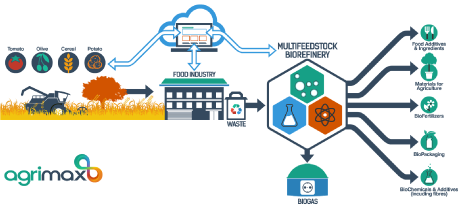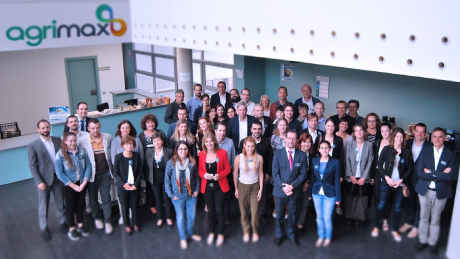Agrimax, a new key project for the Circular Bioeconomy growth
EU generates annually 700 million tons agricultural waste[1]. Furthermore, approximately one third of all food produced globally is wasted every year, which is about 1.3 billion ton per year according to FAO[2]. Food is wasted throughout the whole food chain-from farmers to consumers. The roadmap to a resource-efficient Europe identified food as a key sector needing improvements and this will be key to allow feeding an increasing population.

AgriMax will develop improved biorefinery processes to extract the significant amounts of valuable compounds contained in those wastes that are not currently valorized. To that end, the project will combine affordable & flexible processing technologies (ultrasounds and solvent extraction, filtration, thermal and enzymatic treatments) for the valorisation of side streams from agriculture and food processing industry to be used in a cooperative approach by local stakeholders.
The project will deliver 2 Pilot plants (Spain and Italy) to demonstrate the technical feasibility of different valorisation technologies for treating the acute agri-food waste surplus. It will also demonstrate of the use of the resulting biocompounds in food, packaging and agricultural products. We will furthermore study the suitable business models for the new value chain.
A high impact project for the agrifood sector
Through the cascade valorisation of a large amount of the content of selected agri-food wastes in high added value applications, the project will contribute to the competitiveness of the agricultural and food sectors but also to rural development and employment. Such combined sectors are indeed accounting for 15 million jobs (7.6% of total employment) and 4.4% of GDP and are therefore of outmost importance to EU economy.
The new process will result in number of biocompounds and derived end products with improved environmental performance and cost efficiency as compared to state of the art benchmarks: different biopolymers, coatings, building blocks and additives for bioplastics and packaging, but also for mulching films, agricultural pots, as well as compost and fertilizers and finally also healthier food additives & ingredients, aroma, etc.. That will boost the substitution of non-renewable substances and materials by bio-based compounds of many different types.
The consortium is complementary, combining the expertise of 29 partners from 10 European countries : 11 of them from academia and technology institutes and 18 industry participants (12 SMEs and 6 large enterprises).

A Spanish SME leading the project
IRIS coordinates the consortium and in terms of demonstration, validation and innovation activities, IRIS is responsible for the delivery of some of the extraction modules but also of a monitoring system to follow the biorefinery process and of the integration of the Spanish pilot plant, and finally of the validation of some antioxidant compounds both in food and active packaging. Furthermore IRIS will make a software platform for the cooperative use of the biorefinery assets created in the project. IRIS contribute with their expertise in engineering, monitoring and IT as well as with scientific expertise in biocompounds and biopolymers from waste valorisation.
This project has received funding from the Bio Based Industries Joint Undertaking under the European Union’s Horizon 2020 research and innovation programme under grant agreement No 720719
About BBI: BBI stands for Bio-Based Industries Joint Undertaking. It is a €3.7 billion Public-Private Partnership (PPP) between the EU and the Bio-based Industries Consortium (BIC). The BBI is dedicated to realising the European bioeconomy potential, turning biological residues and wastes into greener everyday products through innovative technologies and biorefineries.
[1] Pavwelczyk, A. (2005). EU Policy and Legislation on recycling of organic wastes to agriculture, International Society for Animal Hygiene, Vol1.
[2] http://www.fao.org/food-loss-and-food-waste/en/

